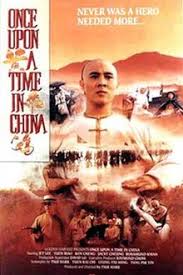Without a doubt, Jet Li is one of the most entertaining martial arts movie personalities of the current generation. In contrast to Jackie Chan, Li usually picks more serious fare for his roles. Before his crossover into the American movie market, he was even more serious than Westerners know him for.

Source: wikipedia
Li's first movie success came with the franchise "Once Upon a Time in China." These movies were shot within the infrastructure of Hong Kong's movie industry. Since its release date in 1991, the movie has become a cult classic that inspired numerous sequels.
During its heyday, however, it was strictly a Chinese phenomenon. There was plenty of reasons that "Once Upon a Time in China" would not have crossed over. The most important of these is likely the politics of the movie. Li plays seminal Chinese folklore character Wong Fei-hung.
The name Wong Fei-hung is revered in Chinese cinema. Whenever the character is used, he is meant to represent a prideful nationalist stance. He is usually fighting a political threat, and many times, this threat is Western integration into Chinese society.
This Is the Case in "Once Upon a Time in China"
After the initial character development, Wong Fei-hung is pitted against a caricature of Western merchants (who also have a penchant for fighting, of course). These businessmen and their goons are all about exploitation of the traditional Chinese culture. They are there to make money and nothing more, and they don't care if they have to prostitute innocent Chinese girls to do it.
Wong Fei-hung has to fight diligently against this exploitation. However, his greater fight is against his own countrymen, who are tempted by the new money the Westerners bring into the country. Many of the Chinese people in the film are telling Wong to stand down, even helping the enemy exploit Chinese girls to aid in the prostitution ring.
Throughout the movie, Wong is seen to uphold Chinese traditions in many ways, not just in martial arts. The Westerners are portrayed as bringing a culture that is completely opposed to the traditions that Wong is used to. In the end, a compromise is reached - but it is an uneasy compromise that begs for a sequel (that came swiftly because of the popularity of the first installment).
Change the Way You Look at Things and ...
The strong portrayal of Wong Fei-hung by Jet Li is actually what catapulted him on the radar of Hollywood producers. Li provided a stark contrast to the comedic physicality of the current crop of Asian movie stars, Jackie Chan chief among them.
Li has made a career of playing characters with the same gravitas as Wong Fei-hung. Over the storyline of his career, it is interesting to note how he has seemingly compromised with Western culture in the same way that Wong Fei-hung realized that he had to compromise at the end of "Once Upon a Time in China."
By his own account, he makes most of his money from Hollywood, and he has played alongside some of Hollywood's biggest stars in decidedly American movies ("The Expendables" series comes to mind).
When you look at "Once Upon a Time in China," take a look at the politics that push the story forward. Perhaps the insights that Li brought forward through the vehicle of Wong Fei-hung can help us create a better world today.
